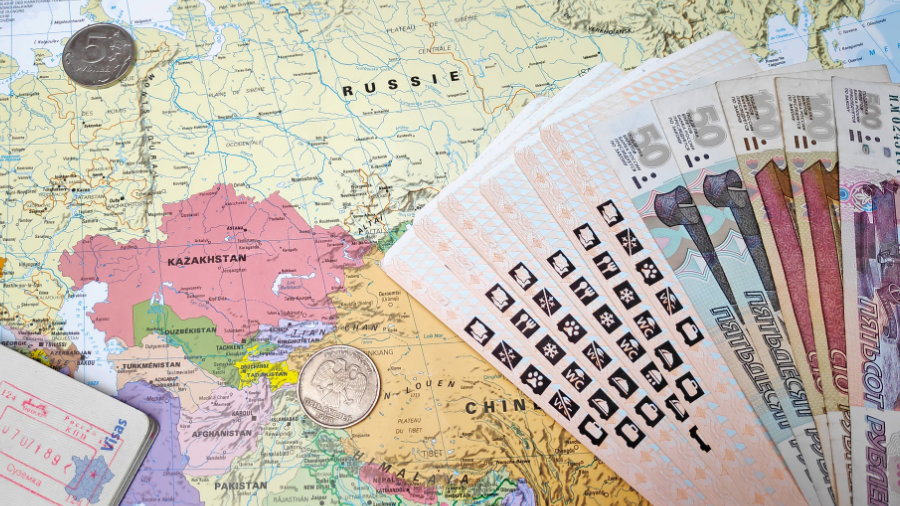A report by the European Bank for Reconstruction and Development (EBRD) has stated that the economies of Central Asia will experience the most rapid growth over the coming two years than any other regions where the EBRD has a presence. Headquartered in London, the EDRB has a significant presence in Eastern Europe.
The bank notes that during 2023 and 2024, Central Asian economies will grow by an average of 4.9% and 5.4%, and notes that the acceleration of growth in the economies of Central Asia is associated with an influx of investment in infrastructure, high energy prices and the relocation of Russian business.
Among the key factors influencing growth are high oil and gas prices for commodity exporters, increased labour, capital, and remittance inflows, as well as increased trade through intermediaries. According to the banks analysts, real GDP will grow the most among the Central Asian states in Tajikistan (8%), Kyrgyzstan and Mongolia (7% each), Turkmenistan and Uzbekistan (6.5% each). In Kazakhstan it will be 3.5%.
The EDRB also noted that in Kyrgyzstan, Kazakhstan and Uzbekistan, and Transcaucasia (Armenia and Georgia) during September-October 2022, an increase in real wages was recorded in comparison with other countries of the EBRD presence. This is underpinned by growing exports and imports, investment flows and the arrival of educated migrants from Russia, as well as high energy prices.
Exports from the European Union, Great Britain and the United States to Central Asia and the Caucasus have increased dramatically, indicated by the growth of intermediary trade: goods are exported to Central Asian countries and then resold to Russia.
According to the EBRD, in Armenia and Kyrgyzstan, such trade amounted to 4-6% of their respective GDP, leading to the growth of their domestic logistics industry, which in turn supports the exchange rate of the local currency against the dollar.
Russia Kazakhstan trade moved upwards in 2022
Supporting this data are the latest trends in Russia-Kazakh trade, which underwent unprecedented shifts during 2022, leading to changes in trade behaviour that have not largely been appreciated in the West. In the EU especially, values have tended to be placed upon the Russian economy measured solely against European impact and discounting the Asian aspect. During the past year, over 11,000 sanctions have been imposed on Russia. But, as a result of the restrictions imposed on the country, the demand for goods from Kazakhstan has increased in Russia. Both countries are members of the Eurasian Economic Union (EAEU) which encouraged free trade between members meaning such developments are relatively simple to understand.
For example, Russia began to buy more computers, monitors and projectors. Kazakhstan also exported iron ores and concentrates, ferrous waste and scrap, raw zinc, ferro-alloys and coal from Kazakhstan, maintaining its domestic productivity.
Although Kazakh imports from Russia fell by 1.4%, this is a relatively small amount, largely the impact on financial transactions being curtailed due to SWIFT cut off. However, this was plugged by inter-bank trade, with Kazakhstan buying oil and oil products, wheat and flour, ores and concentrates of precious metals, iron bars and gold. Overall, during 2022, bilateral trade reached US$26.1 billion, up 6% compared to 2021, suggesting the impact of Western sanctions, while having a huge effect on the European trade with Russia, had a positive effective on its trade east.
Russian operated bank accounts in Kazakhstan have increased by 44 times
During the period February 1, 2022 to 2023, 578,000 new sub-accounts were opened in the Kazakhstan Central Securities Depository, of which 4,005 sub-accounts were in the name of non-resident individuals. Of those, 2,413 were directly attributable to Russian citizens and companies. In comparison, 56 were opened by Russian nationals in 2021.
This compares with 9 accounts opened by Ukrainian nationals in 2022 (2021: zero) and 25 accounts opened by Belarus nationals (2021: two) The Deputy Chairman of the National Bank, Aliya Moldabekova, said that any opening of accounts with the Central Securities Depository or in second-tier banks must be accompanied by a very strict KYC (Know your client) procedures. “If some sanctioned person or a person associated with a sanctioned person opens accounts in our country, then we fall under the risk of secondary sanctions,” Moldabekova stressed. It should be noted that sub-accounts in the Central Securities Depository of Kazakhstan can be opened only through brokers or banks, suggesting that the Russians relocating to the country are legitimate and non-sanctioned individuals and businesses.
Source :Russia Briefing















